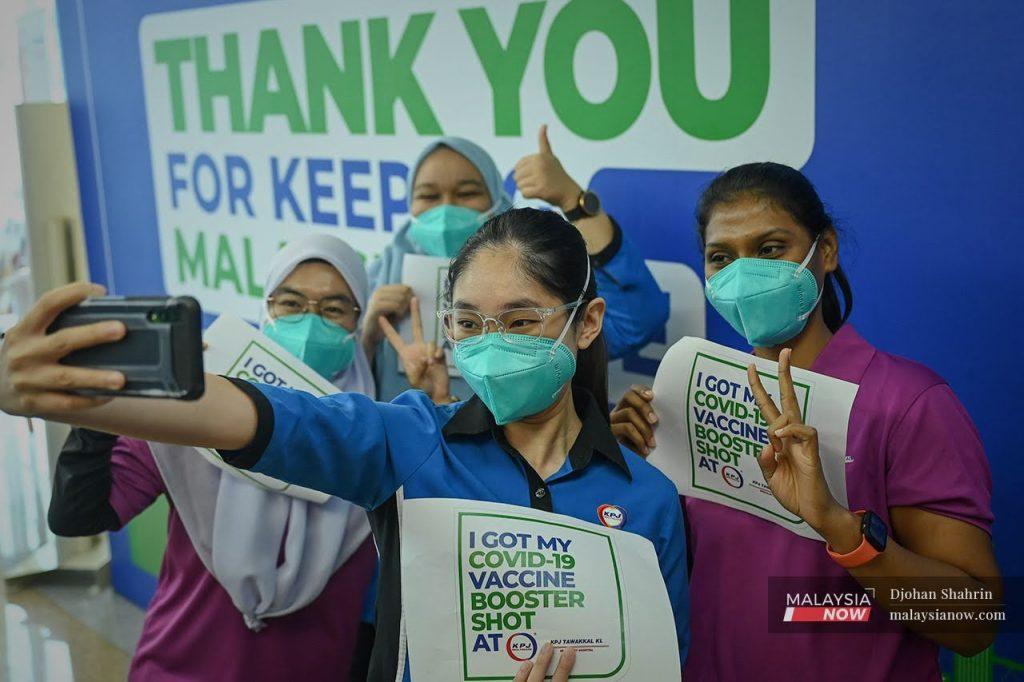Anti-vax or just hesitant? Why booster jab uptake among Malays is low
Experts delve into recent statistics showing that the Malays lag behind other communities in getting a booster shot of Covid-19 vaccine, even amid the Omicron wave.
Just In
Many Malays appear to be adopting a wait-and-see approach to receiving a booster dose of Covid-19 vaccine despite the drastic increase in cases due to the ongoing Omicron wave, experts say following the health minister’s recent revelation that the community is lagging behind others in this regard.
Khairy Jamaluddin said last week that less than 50% of Malays had received a booster jab, while the Chinese led with 81.3% followed by the Indians (56.4%), Orang Asli and other Bumiputeras (49.6%) and other communities (50.6%).
Fauziah Mohd Sa’ad, a psychologist at the Sultan Idris Education University, said the Malays wanted to observe the effects of the booster shot before deciding whether to receive one or not.
“They will only want to take it if there are no side effects,” she told MalaysiaNow.
The same scepticism towards vaccine booster doses is evident among Malay social media users, even as campaigns promoting booster jabs and vaccination for children gains momentum online.
Khairy himself has been targeted by those who dispute his vaccination status despite numerous statements refuting such claims, while his son was recently subject to similar speculation after a video alleging that he had been injected with air instead of the vaccine went viral on social media.
Online discussions or reports related to booster jabs are also frequently hijacked by users who interject with sarcastic comments.
The government began administering booster shots for fully vaccinated people on Oct 13 last year.
In December, Khairy announced that senior citizens and those who had received two shots of the Sinovac Covid-19 vaccine would need to take a booster jab by March 1 in order to maintain their fully vaccinated status.
He said earlier this month that some 3.5 million individuals initially inoculated with Sinovac had yet to receive a booster shot, along with 32% or about a million senior citizens.
But public health expert Dr Zainal Ariffin Omar said there was a difference between anti-vaxxers and those who were hesitant to receive a booster jab.
“The majority of them were initially administered vaccines of a different brand,” he told MalaysiaNow.
“At first, these doubts occurred on an individual basis. But because they were amplified by a number of factors, they began shaping the beliefs of the group as a whole, especially among the Malays who have a high level of community trust.”
Zainal said the situation could be traced back to socioeconomic status and education.
He added that the Malays were mostly confident in the primary vaccine they had received, and did not believe that the wave of infections this time around was as severe as it was in the initial stages of the pandemic.
Fauziah meanwhile said the Malays were influenced by issues that go viral on social media.
“For example, the effects of the vaccines are said to be harmful even though the individual in question might already have had a certain disease or illness,” she said.
“The Malays also talk about all kinds of ideologies and views on social media.”
Based on feedback received from frontliners, she said, the Malays appeared to be lacking in knowledge and awareness about Covid-19 and its variants even when the government offered explanations.
Zainal, who leads a group of community volunteers against Covid-19, agreed. He spoke of negative reports about booster shots on both the local and international levels, adding that the Malays have a trust deficit in the authorities.
When asked why scepticism exists even among those who have been fully vaccinated, Fauziah said this might be due to the fact that the government had made two doses compulsory for all, but not a third.
She said the Malays were also wary of the vaccine’s effects on their children.
“They only think about the effects of the vaccine. They don’t think about the long-term effects if their children are infected with Covid-19,” she said.
“Out of 1,000 cases perhaps only one will experience any side effects at all. Even this depends on the child’s resistance and whether he or she has any other health conditions.”
As of Feb 17, 289,912 children or 8.2% of those aged five to 11 had received a first dose of Covid-19 vaccine.
Fauziah said the authorities must continue to conduct awareness programmes targeting the Malay community.
“There are some among the Malays who will easily accept anything without thinking about it, what more if they are told so by influential leaders,” she said.
“This can be addressed by educating them. Explain to them about the Covid-19 variants, about mutations and the effectiveness of a booster dose in protecting against these.”
Zainal meanwhile said that the government should not intimidate, adding that people should be given a choice.
He said it was also important to involve those without any vested interests.
“Cut down on the use of politicians, artistes and others who don’t really understand the issue,” he said.
“And share information about side effects on a frequent and transparent basis.”
Subscribe to our newsletter
To be updated with all the latest news and analyses daily.
Most Read
No articles found.
